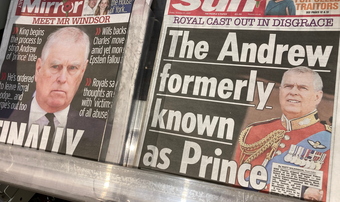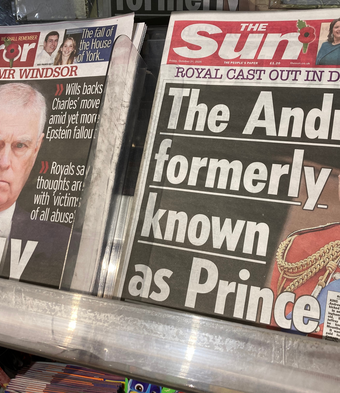The King's Coronation: to pledge or not to pledge?
(Image courtesy of Chris Boland)
The Coronation of King Charles III is the big story in the UK this week (sorry to any local councillors who think it is the local elections!). One of the controversies around the ceremony concerns the pledge of allegiance. The Homage of the People, to give it its formal title, will invite everyone to say: “I swear that I will pay true allegiance to Your Majesty, and to your heirs and successors according to law. So help me God.”
Since being announced a couple of weeks ago, the pledge has encountered a mixed response. Some of this comes from expected sources: Graham Smith, spokesman for Republic, said, "In a democracy it is the head of state who should be swearing allegiance to the people, not the other way around.”
Lambeth Palace has been keen to play down the controversy, with the Archbishop of Canterbury saying, “In every Anglican service, every Christian service, it is normal for congregations to participate. It's an invitation - so if you want to join in at this point, by all means do so. If you don't want to, that's fine. There's no drama to it.”
Interestingly, Jonathan Dimbleby, a friend of the King’s, spoke out this morning, saying that he believed the pledge – which is a new innovation for this coronation, and is without historic precedent – was effectively a PR move gone wrong: “He's never wanted to be revered. He's never wanted, so far as I know, to have anyone pay homage to him except in mock terms as a joke. He wants, I think, to feel that people will share in the event.”
Before addressing the issue of the pledge itself it is important to remember the context in which the invitation is made. The Coronation Service is a Christian service. Yes, it reflects the ‘anointing’ of the King and establishes the monarch’s status and ‘rule’ over others.
But it also acknowledges that even a King is subject to God’s authority and sovereignty, and that the King should be following Christ’s own example. The service is due to begin with a chorister speaking the words: “Your majesty, as children of the Kingdom of God, we welcome you in the name of the King of Kings.”
The King himself will reply: “In His name and after His example, I come not to be served but to serve.”
We should celebrate the fact that so much of the Coronation service witnesses God and His sovereignty over every person and all of creation. Surely this is something we want to affirm in a culture that is quick to dismiss profound symbolism that points to God as quaint or dangerous tradition.
As we consider the context in which we are invited to make the pledge we should also pray for the subject of the pledge: the King and his relationship with the Lord of Lords. Over the last few weeks, I have had several conversations with disgruntled Christians bemoaning the King’s ambiguity in speaking about his personal faith.
Compared to his mother he is far less clear in being clear about where he stands in relation to the Christian gospel, but I also think it is unfair to judge him by words he spoke many years ago, or to look for the worst in what he says. We need to pray for the King’s faith and for him to trust in our Lord.
At the same time, I believe we can also give thanks that he is open about seeking and believing in God, and is committed to protecting freedom of religion for all. This latter commitment has been viewed with suspicion by some – Charles has never fully escaped the spectre of his pledge to be a ‘defender of faith’ rather than a ‘defender of the faith’ – but the King, within the speech made at his accession, made clear his commitment to his role as Supreme Governor of the Church of England, and the fact that the Coronation service remains so deeply Christian is reassuring for many of us.
According to reports, he, like his mother before him, views the deeply personal vows to God and the anointing with Holy Oil in the tradition of Old Testament Kings as a deeply serious commitment. Again, I thank God that he does realise the seriousness of his words and actions. The King will also publicly pray himself during the service.
Let us pray for the Holy Spirit’s work softening the King’s heart and mind to God’s word. Let us pray for him to be surrounded by faithful witnesses who are wise, bold, creative and gracious in sharing the truth with him.
I think these are important elements that help locate how we are to understand the invitation to pay homage to the new King. However, I know that I have still personally struggled with what we are invited to say, and this is in part because I am being asked to pledge true allegiance to the King and his heirs.
In 1 Peter 2:17, we read: "Show proper respect to everyone, love the family of believers, fear God, honour the emperor." But to "honour the emperor" (or the king) is not the same as pledging true allegiance.
Consulting my lawyer friends, I am still not clear what true allegiance constitutes, but I can see how it might jar against a Christian’s ultimate allegiance to King Jesus. Is true allegiance the same as ultimate allegiance?
The matter of pledging allegiance to something is not itself bad. Most of us will formally or informally be loyal or committed to something without that something challenging Jesus’ Lordship in our lives. We may feel a deep allegiance to our church or denomination, our football team, or political party. Those seeking citizenship in nations without a monarch often have to swear allegiance to ‘the Republic’, or ‘the Flag’. For most Christians this does not seem to pose a problem. If our allegiance to the King is this kind of allegiance, then we are free to make the pledge.
Conversely not repeating ‘the Homage’ on Saturday is not, in my view, a mark of disrespect. Many will choose not to repeat the Homage of the People and that should be respected. It is legitimate to accept the authority of Charles and to respect Him and his office, and still not feel able to say the pledge in good conscience, whether because of what true allegiance may signify or because of sincere republican beliefs.
And so, come Saturday, the choice is for each of us to make, and whether we repeat the Homage of the People or not, we can unite in CARE’s Prayer Diary entry for Saturday 6 May:
‘Lord God, You provide for Your people by Your power, and rule over them in love: Grant to Your servant our King, Charles III the Spirit of wisdom and discernment, that being devoted to You with his whole heart, he may so wisely govern, that in his time we may live in safety and in peace; through Jesus Christ our Lord. Amen.’






